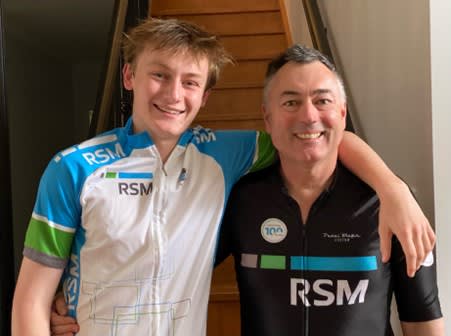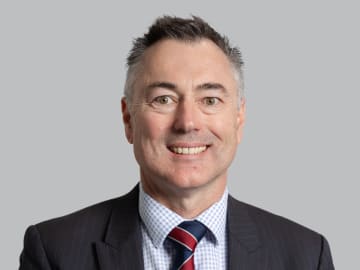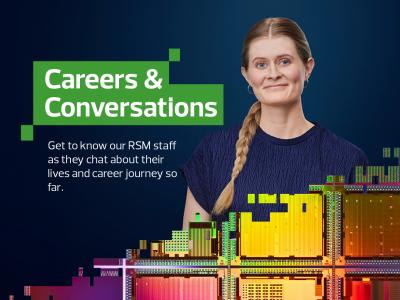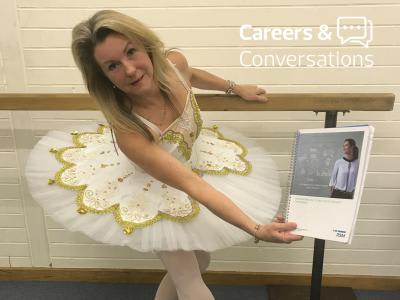Meet Andrew Bowcher – Partner, Wagga Wagga
Andrew Bowcher is passionate about serving his community, and this belief is a guiding force in both his professional and personal life. Whether he's working as a Partner at RSM, leading community initiatives, cherishing time with his family, or passionately advocating for Indigenous organisations, Andrew's commitment to making a difference shines through in everything he does.
Personal life
YOU HAVE LIVED AND WORKED IN WAGGA FOR A LONG TIME – WHAT KEEPS YOU IN THIS SCENIC REGIONAL TOWN?
I was born in Wagga Wagga and my wife and I wanted to raise our children in a large regional community. We think Wagga has the right balance between country life style and the benefits of a large regional centre such as access to education, sporting facilities, medical services, and shopping.
OUTSIDE OF WORK, WHAT ARE YOU PASSIONATE ABOUT?
I am passionate about family, being physically active, helping others and being actively involved in my community.
Over the years I have served on many community organisations and boards. Looking back, some of the things I am proud of include:
- Commencing and building The Riverina Anglican College a K-12 Co -Educational, 1200 student, IB and HSC school
- Working with our local State Member Dr Joe McGirr when he was CEO of Greater Murray Health Service creating the Albury and Wodonga Health Service and merging the Wodonga and Albury Base Hospital into one managed entity.
- Having the Oasis Sports facility built in Wagga – Indoor and outdoor (heated pools) at Olympic competition design and standard.
WHAT IS SOMETHING WE DIDNT KNOW ABOUT YOU?
I have two things for you. One – boarding school gave me a lifelong aversion to seafood. During my years at boarding school, we had to have fish every Friday night for dinner. The fish smelt so bad when you entered the dining room, it turned me off all seafood.
My other fun fact is that in 1988, the Australian Bicentennial Year, I was in my final year of secondary school and serving as a school leader. I had the opportunity to have breakfast with then-Prime Minister Bob Hawke, the Governor-General, the New South Wales Premier, and the Victorian Premier during the official opening of the Bicentennial Year on January 1st. I found Bob Hawke to be very funny and engaging and in hindsight, it was a great honour. But I have to say that as a 17-year-old, I didn’t fully appreciate it at the time.
Professional Life
WHAT CHALLENGES HAVE YOU FACED THROUGHOUT YOUR CAREER?
I have never hidden the fact that living with dyslexia has been challenging. However, I have systems in place to ensure that my job performance isn't impacted. I take pride in the fact that, despite my dyslexia, I earned my CPA and CA qualifications and went on to pursue further postgraduate studies and qualifications. I think you can achieve anything if you really want it.
WHAT IS THE BEST PIECE OF PROFESSIONAL ADVICE YOU HAVE EVER RECEIVED?
I have a few, however it would come down to these three:
- “The greatest fear is the fear of the unknown.”
- “Just because you know doesn’t mean others will know; so make sure that you communicate clearly.”
- “When you think you are the smartest person in the room, go outside and remind yourself that you aren’t.”
WHAT ADVICE WOULD YOU GIVE TO INDIGENOUS ORGANISATIONS FACING FINANCIAL UNCERTAINTY OR GOVERNANCE CHALLENGES?
In many cases, the organisation would benefit from the support of an external party. Such a party can assess the issues at hand, engage with various family groups to identify concerns, and negotiate a pathway forward. They can also help with conflict resolution and recommend and implement reporting structures and mechanisms to improve financial management and control. Additionally, they can liaise with external stakeholders, including funders, government regulators, members of the community, and others.
In many cases, the organisation would benefit from the support of an external party. Such a party can assess the issues at hand, engage with various family groups to identify concerns, and negotiate a pathway forward. They can also help with conflict resolution and recommend and implement reporting structures and mechanisms to improve financial management and control. Additionally, they can liaise with external stakeholders, including funders, government regulators, members of the community, and others.

Life at RSM
WHAT LED YOU TO WORK WITH INDIGENOUS AND TORRES STRAIT ISLANDER ORGANISATIONS?
I began working with Aboriginal communities and organisations 30 years ago when I started my career in Hay and Ivanhoe, NSW. After gaining experience with other firms, I joined RSM 23 years ago.
Since being with RSM, the depth, complexity, and variety of engagements have significantly increased. I have handled matters all over Australia, including remote, regional, and urban areas.
The skill set required as an insolvency practitioner is highly transferable, as you need to problem solve, work with people and find solutions.
YOU HAVE EXTENSIVE EXPERIENCE IN GOVERNANCE AND FINANCIAL MANAGEMENT—WHAT ARE SOME OF THE BIGGEST CHALLENGES INDIGENOUS ORGANISATIONS FACE IN THESE AREAS?
Every community and organisation face their own specific challenges. In general, many communities have low literacy and numeracy levels, poor housing, limited access to health providers, minimal transport options and distance and isolation. These social issues can impact the organisation via workforce, management, service delivery and governance.
Over the years there has been a focus to address these issues, and we have seen many Aboriginal and Torres Strait Islanders being trained in health, allied health and social services.
One area that there is a low representation is in the area of accounting, finance and governance advisory and this is why we have created an outsourced Not for profit and bookkeeping Service that specialises in working with Aboriginal and Torres Strait Islander organisations and communities.
We have Aboriginal team members who work in this division, and we assist with accounting, bookkeeping, grant acquittals, budgeting, business plans, cashflow management, governance advice and strategy as well as mentoring for CEOs and Boards.
Having Aboriginal team members is very important as they are great role models, can work very closely with these communities and organisations and help support self-determination.
HOW DO YOU APPROACH DEVELOPING SOLUTIONS THAT RESPECT CULTURAL TRADITIONS WHILE ADDRESSING FINANCIAL AND OPERATIONAL CHALLENGES?
My team and I have completed cultural awareness training, which has helped significantly. Over time, I have learned about important concepts such as the distinction between Lore and Law, the concept of sorry business, how aboriginal tribes and mobs were historically structured, their idea of community, community sharing, and especially how to communicate.
To work long-term in this sector, you have to be open, honest, clear, and direct. Many communities have low numeracy and literacy levels, but they are extremely intelligent. They assess you based on your spoken words, actions, and non-verbal cues, such as body language. Once you are accepted by people and communities, they become lifelong relationships. I have been very lucky to work with and meet many wonderful people in places such as Wilcannia (NSW), Brewarrina (NSW), Alice Springs (NT), Balranald (NSW), Urapunga (NT), North Queensland, and various regions in Western Australia (including Pilbara, Gold Fields, Broome, and Beagle Bay), as well as South Australia.
WHAT IS THE MOST REWARDING PART OF YOUR WORK?
Honestly there are so many rewards to my job. It is rewarding to see our Regional NSW and Regional VIC R&R team grow. We have 20 team members, and they are fantastic people to work with and be around. I also have two Directors I work with in our team, Tim Gumbleton and Steven Priest and they are extremely capable and knowledgeable people who I greatly admire and respect.





